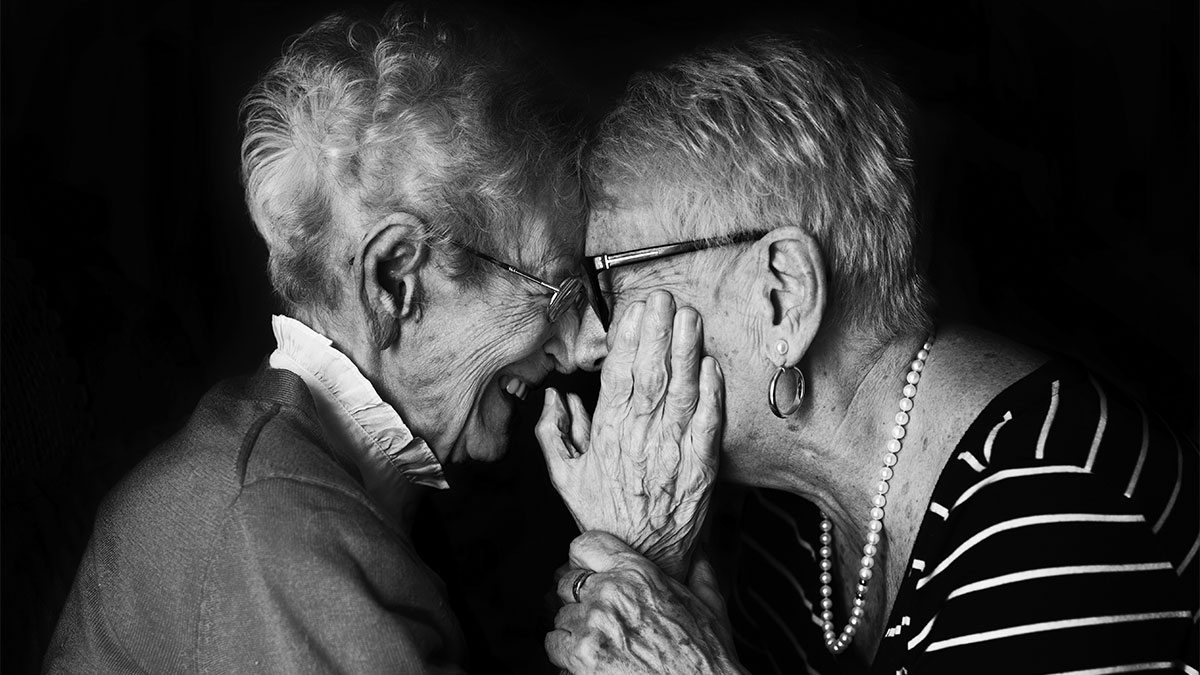If you live long enough, sooner or later you realize you’re old. You may not feel old, but face it, you are. It took me a while to recognize that I was getting old. It seemed strange that I had friends in their seventies or eighties with grown children and even grandchildren. If I looked in the mirror, I felt a disconnect from the image I was seeing. What I felt inside did not match what I saw.
The aging process opens whole new perspectives. And I’ve tried to use this stage as an opportunity to reflect on the entire arc of my life—but in doing so, it all begins to feel surreal, wonderous, mysterious, already gone. It has a “what was that?” quality, as when something zooms past you so fast you’re not sure if you saw it or not. There’s a groundlessness about the whole experience, and also a new sense of lightness. How solid was any of it?
“Aging can bring you to your core.”
As we age, our life is filled with endings and partings. Each time we see a loved one, it may be the last time, and each time we do something, it may be for the last time. This knowledge can be distressing. It can feed our fears and our clinging, but it often does just the opposite by engendering a deeper appreciation for the moments we still have to connect with one another and engage with life. It brings out a core of tenderness and poignancy deep within us.
Aging teaches us about boundaries and uncertainties. Our world and our own self can seem solid, but we’ve not been around all that long, and we will soon be gone. It’s strange to reflect on where we were before we showed up in this life, and it’s equally strange to know we’ll be leaving—going who knows where. Yet amazingly, here we are! Right here, right now. The very ungraspable quality of this experience makes it all the more colorful and intense.
The precarious nature of life and circumstances becomes more obvious as we age. You may be doing pretty well one day, but a fall or a bout of illness is all it takes for your entire world to be disrupted with loss upon loss. Some people age well and are relatively healthy; others decline rapidly to frailty or dementia. It seems so unfair that some of us have the means and the relationships to find the help we need, while others have to deal with old age with no resources and no help. You cannot assume that you have all the time in the world or that you’ll continue to enjoy good health and circumstances.
In a society that often romanticizes youth and dismisses the aging process, Buddhist teachings offer a refreshing perspective—one that neither romanticizes nor demonizes the natural progression of life. There are certain life experiences that are simply unavoidable, no matter who you are, and aging is one of them. Buddhist scriptures give vivid descriptions of the suffering of old age. They make no bones about how painful and humiliating it can be and emphasize how important it is to prepare yourself to deal with it. There’s wisdom in recognizing the harsh realities of aging as well as the potential for growth and insight it brings. Personally, I’ve found that bad news, when spoken about truthfully, can be a form of good news. The uncertainties and declines of aging give a strong message: work on yourself while you can, don’t wait. What is is what you have to work with, not what was, not what might be, not something else.
Our individual aging takes place in a cultural context. Modern materialistic cultures don’t deal well with aging, and anti-aging attitudes make it harder to be old. Old age is considered to be dreadful and embarrassing, so we do our best to cover it up. There’s a huge industry designed to help us pretend to be younger than we are. We’re told that if we use the right cosmetics, do the right exercises, eat the right food, we can stay young. But that bubble of pseudo-youth we manufacture needs to be maintained against the threat of reality. In the end, covering up the reality of aging doesn’t help; instead, it promotes needless suffering and pain.
The experience of aging brings to the surface key issues of our identity. By the time we become old, we’ve had many roles in life, and we may have dominant roles with which we’ve strongly identified. When those roles and labels start falling away, we can feel lost. We’re forced to confront who we are apart from those roles. Aging uncovers attachments we didn’t even know we had. We bump up against our vanity, our clinging to beauty or handsomeness, our need for power or to be someone in society. This isn’t easy, but it’s an opportunity to ask, “Who am I really, in all that?”
Our own aging challenges us to work with our preconceptions in relating to others. What has been your experience of being around elderly people? What were you taught when you were young about aging and mortality? What are your assumptions as to how you should be as an older person? Preconceptions have powerful effects. Scientists found that people who were taught that old age was just something to be endured had a poor health trajectory and went down rapidly. People with similar health conditions who took an interest in their aging and were curious about that stage of life had much better health and well-being and greater life spans.
When you reach a certain age, you realize you most likely have only a few more relatively healthy years left. You’re challenged to confront basic questions about your life and how you spend your time. In your few remaining years, you have a chance to focus on what you can realistically do and on what matters most. You begin to let go of all those things you’re not ever going to be able to do.
Regrets and disappointments are a part of the process of growing older. Maybe you’ve been practicing meditation for years and wonder, “Is this as much realization as I’m ever going to get, and is that okay? Could I have been better, saner, more realized?” We’re stuck with: This is it. This is my life. What’s the point? What does it all mean? But along with that, there are moments when you’re in touch with a sense of awe that somehow in the vastness and timelessness of space/time, you found yourself in a life. You begin to see your particular life and your unique qualities as a manifestation of a primordial energy pattern that’s continually arising, dissolving, and rearising. You see yourself as a reflection of a creative and benevolent energy pattern that has been going on forever, and you’re moved by it.
Aging can bring you to your core. The challenges of the physical decline as you approach the end of life can strip away what’s not essential and reveal your true nature. It’s not that you’re digging around trying to find what’s essential; it’s more that superficial preoccupations simply fall away. Your old assumptions, roles, place in society, notions about who you’re supposed to be and how you’re supposed to act—all that begins to fall away to reveal something much more valuable and real: your inner nature, which is clear, luminous, spacious, and empty like the sky.

